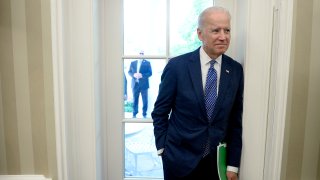
- In a document entitled "A new EU-U.S. agenda for global change," the European Commission defined four major policy areas to focus on: health response, climate change, trade and tech, and security.
- Going forward, the EU said it wants a "transatlantic dialogue on the responsibility of online platforms and Big Tech, to find global solutions for fair taxation and market distortions in the digital economy."
- The commission wants stronger cooperation in tackling the coronavirus health emergency which has claimed nearly 1.5 million lives around the world.
LONDON — The European Union announced a new plan on Wednesday to improve relations with the U.S. ahead of the inauguration of Joe Biden.
It's been a tense four years of trans-Atlantic ties, with President Donald Trump and the EU clashing over trade, defense, technology and foreign relations — to name a few points of contention.
As the Biden administration is due to arrive at the White House on Jan. 20, the EU has not wasted any time and has prepared a new plan to reset that relationship.
"We are taking the initiative to design a new transatlantic agenda fit for today's global landscape," European Commission President Ursula von der Leyen said in a statement Wednesday.
"It is time to reconnect," she added. Meanwhile, the commission's executive vice president, Valdis Dombrovskis, told CNBC the EU was sending a "signal that we are ready and willing to engage with the U.S."
In a document entitled "A new EU-U.S. agenda for global change," the European Commission, the executive arm of the EU, defined four major policy areas to focus on: health response, climate change, trade and tech, and security.
Money Report
Tech and trade
The European institution has made headlines for investigating and fining U.S. tech giants for abusing their dominance in the European market — a stance that was often criticized by Trump. The commission is also announcing new policies next week to enable stronger powers to scrutinize Big Tech and ensure fair competition in the market.
Going forward, the commission said it wants a "transatlantic dialogue on the responsibility of online platforms and Big Tech, to find global solutions for fair taxation and market distortions in the digital economy."
The idea is to have a more harmonized stance and come to an agreement on how to tax these companies.
The EU had hoped for a digital tax agreement at the Organization for Economic Cooperation and Development this year, but the Trump administration walked out of the negotiations in the summer.
The idea is to conclude the talks by mid-2021.
When asked about whether January — when Biden takes office — until June is enough time for an agreement, Europe's trade chief Dombrovskis said: "We think half a year is definitely enough time to reach an agreement if there is political will from all sides and if U.S. is willing to come with a fresh approach to this specific issue."
In the absence of an OECD deal, he said, the commission will table a proposal for an EU-wide digital tax in the middle of 2021.
The commission also said that as part of its policy aims with the United States, it wants to "develop a common transatlantic approach to protecting critical technologies in light of global economic and security concerns — starting by discussions on 5G."
There have been tensions over granting Huawei, a Chinese firm, access to develop infrastructure for 5G. The EU and the U.S. have not seen eye-to-eye on this matter, with the U.S. outright banning Huawei from American contracts and the commission just suggesting to EU member states they should take into consideration the "policy framework to which suppliers may be subject to."
Trump also slapped tariffs on European steel and aluminum shortly after taking office and threatened to do the same on European carmakers. Despite attempts to develop a U.S.-EU trade deal, this ultimately failed.
The EU also said Wednesday it wants to "work together to lead" World Trade Organization reform efforts and "solve bilateral trade irritants through negotiated solutions."
"We have several ongoing trade disputes between EU and the U.S., including steel and aluminum tariffs, which the U.S. took unilaterally; we have the Airbus-Boeing dispute and of course we are reaching out proactively to the (new) U.S. administration to resolve those disputes," Dombrovskis told CNBC on Wednesday.
The pandemic
The commission wants stronger cooperation in tackling the coronavirus health emergency, which has killed nearly 1.5 million people around the world.
In its latest plan, it said: "The EU and the US should ensure funding for the development and equitable global distribution of vaccines, tests and treatments."
Addressing the pandemic has also been an issue during the Trump administration, with the president taking unilateral decisions, namely to shut down American travel with EU nations without informing European policymakers first.
Trump also halted funding to the World Health Organization and announced the U.S.'s intention to stop being a member of that institution.
The EU said they need to "work to reinforce and reform the World Health Organization."
Climate and security
The EU is also hoping for stronger coordination in fighting climate change.
President-elect Biden has promised to bring the U.S. back into the Paris climate agreement, which sets emission targets, after Trump turned his back on the deal.
According to the commission, trans-Atlantic aims should feature the fight against deforestation and ocean protection.
The EU suggested a closer alignment "to support democratic values around the world, as well as global and regional stability, prosperity, and conflict resolution" — a political direction that could ultimately impact how the U.S. and the EU negotiate with China.
A summit between the U.S. and the EU could take place in the first half of 2021.






